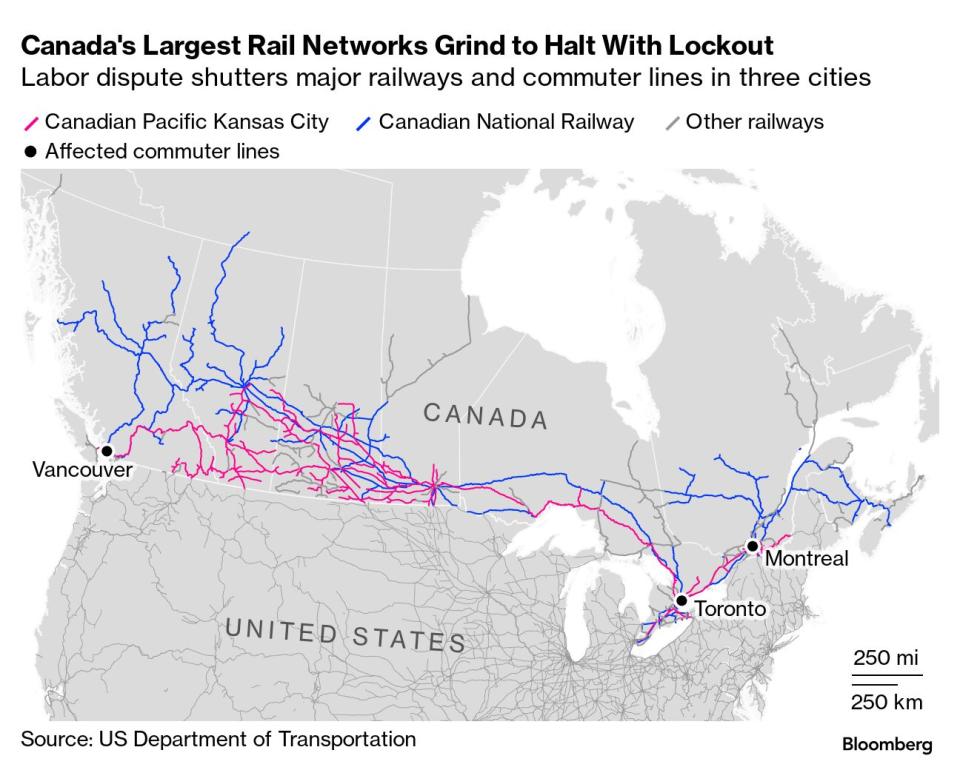Canada’s Railways Lock Out Unionized Workers, Snarling Trade

(Bloomberg) --
Most Read from Bloomberg
Chicago's Migrant Surge Is Stirring Trouble for Democrats in DNC Host City
UK Transport Minister Clears Path for More 20mph Speed Zones
With Self-Driving Vans, Hamburg Tries to Make Microtransit Work
Canada’s two biggest railways shut down early Thursday after talks with union leaders failed, immediately blocking arteries of North American supply chains that carry about C$1 billion ($740 million) per day in trade.
More than 9,000 employees at Canadian National Railway Co. and Canadian Pacific Kansas City Ltd. were locked out after a deadline passed without an agreement on a new contract. Members of the Teamsters Canada Rail Conference had voted to strike over a number of issues, including scheduling and worker fatigue.
The economic consequences will be swift if the lockout lasts for days. Canadian National and Canadian Pacific control about 80% of the country’s rail network. The railways have had labor disruptions before, but it has been decades since both freight carriers had a major strike or lockout at the same time.
For many commodities, there are no good shipping alternatives. Companies that sell wheat, fertilizer, chemicals and other goods will feel the pinch right away. Grain futures rose slightly in early trading Thursday as traders assessed the impact. A lumber company in British Columbia announced plans to cut production at a sawmill within days.
The shutdown will have “ripple effects” across the continent, “especially given uncertainty toward potential strikes at US ports and given soaring global shipping costs driven by avoidance of the Red Sea and Suez Canal,” Bank of Nova Scotia economist Derek Holt said in a note to investors.
“Some of these shocks could be transitory (strikes, though of uncertain length and magnitude) and some longer-lived (geopolitical) but they risk feeding off of one another at an inopportune moment for sectors like agriculture and retail orders for the holiday shopping season,” Holt said.
Morning commutes in Canada’s three largest cities were also affected. Trains in Toronto, Montreal and Vancouver that use Canadian Pacific tracks weren’t operating. Those lines typically carry an estimated 32,000 passengers a day.
Prime Minister Justin Trudeau said workers, businesses, farmers and consumers across Canada are set to be impacted. “That’s why we are on this. We’re taking it so seriously,” he told reporters in Sherbrooke, Quebec, on Thursday morning.
“We are not taking this lightly, obviously, because Canadians across the country are worried about it. And we’ll have more to say shortly on what we’re doing to make sure that the right solution is found quickly for the economy.”
Shares of the two railways were little changed in early afternoon trading in Toronto. Canadian Pacific shares have gained 4% this year, while Canadian National has lost more than 6%.
The lockout applies only to Canadian workers, not to the railways’ large operations in the US and, in the case of Canadian Pacific, Mexico.
The stoppage may cost Canada as much as C$341 million per day, according to a Wednesday estimate from Moody’s Corp.
Canadian National said in an emailed statement that it made offers to improve wages and rest time. “The Teamsters have not shown any urgency or desire to reach a deal that is good for employees, the company and the economy,” the company said via a spokesperson. A Canadian Pacific spokesperson said the union continues to make unrealistic demands that would fundamentally impair the railway’s ability to serve its customers.
Union President Paul Boucher said the main obstacles to reaching an agreement were the companies’ demands. “Their sole focus is boosting their bottom line, even if it means jeopardizing the entire economy,” he said in a statement.
As the deadline approached, business groups and rail-dependent industries from automakers to agriculture issued warnings about the economic damage — including the potential of longer-term harm to Canada’s trading relationships and reputation for reliability, following other recent disruptions to its transportation networks.
US Transportation Secretary Pete Buttigieg said earlier this week that his department had been monitoring the situation closely and tracking the flow of vital goods to the US. The US Chamber of Commerce has called on the Canadian government to intervene.
The labor disruption creates an urgent problem for the federal government. Labor Minister Steven MacKinnon denied Canadian National’s request to impose binding arbitration last week and encouraged parties to reach a deal at the bargaining table. The minister also met with the parties and federal mediators on Tuesday and Wednesday.
Trudeau’s government is propped up in parliament by a deal with the pro-labor New Democratic Party, whose leader, Jagmeet Singh, had said he would oppose government measures to intervene on behalf of employers against workers. But it’s still an option for the government to introduce legislation that would force an end to the impasse.
--With assistance from Monique Mulima, Erik Hertzberg, Raeedah Wahid, Doug Alexander and Curtis Heinzl.
(Adds comment from the prime minister, share price information beginning in the eighth paragraph.)
Most Read from Bloomberg Businessweek
‘I’m So Scared’: NFL Players on How Betting Changes the Sport
Covid Hobbled a Profitable Bond Trade. High Interest Rates Are Reviving It
©2024 Bloomberg L.P.
